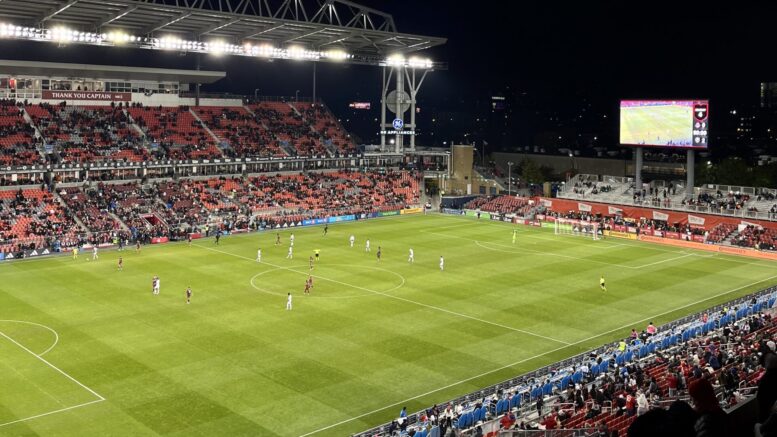In 2018, expenses associated with hosting the World Cup ranged between $30 million and $45 million. However, the new estimated cost for Toronto to host the 2026 FIFA World Cup soccer games is nearly $380 million.
The World Cup is the largest international soccer tournament that is held every four years in varying host countries. The first ever World Cup tournament was held in 1930 and took place in Uruguay. Decades later, the tournament is recognized as an opportunity for global unity, as people worldwide come together to watch the sport’s top players and teams, celebrating their respective countries through the spirit of soccer.
The 2026 FIFA World Cup will be split amongst three host countries; the United States, Mexico, and Canada. Canada will be hosting the games for the first time, with Toronto and Vancouver selected as the host cities.
As anticipation builds, here is a deeper look at the layout of the tournament and what it means for Toronto.
How will the event be organized?
Among the United States, Mexico, and Canada, 16 cities will host games. The cities will be divided into three areas: the Western, Central, and Eastern regions. The tournament’s first game will be played on June 11 in Mexico City. Forty-eight teams will be divided into 12 groups of four. The first and second teams in each group, along with the top eight third-place teams will advance to the new “round of 32.” From there, teams will progress through the round of 16, quarter-finals, and semi-finals, all leading to the bronze medal final on July 18, and the highly anticipated World Cup Final game on July 19 in West New York, N.J.
Which games will be played in Toronto?
Toronto is set to host six games. The first is a group stage match on June 12, 2026, featuring the Canadian Men’s National Team. This will be the first-ever World Cup game played on Canadian soil. These six matches comprise five group stage games and one round of 32 match, all set to be played in BMO Field, current home of MLS soccer club, Toronto FC and CFL team, Toronto Argonauts.
What changes will be made to welcome the World Cup to Toronto?
To prepare for the games coming to Toronto, the city will be undergoing a makeover.
Prof. Simon Darnell specializes in sports mega-events and is a member of the Faculty of Kinesiology and Physical Education at the University of Toronto. He says that the World Cup presents a chance for Canadian soccer to become more “internationally relevant” and expand its identity of Canadian nationalism.
He shared that having Canada host games is a great way to “showcase who Canadians are and what Canada is.”
Renovations will be done to BMO Field to fit FIFA’s regulations, fan zones set up around the city, as well as other city-wide plans to deem it ready for the tournament.
BMO Field’s temporary rebrand begins by changing its name to “Toronto Stadium” during the games, adhering to FIFA’s marketing regulations for non-sponsor entities.
Extensions to the stadium will be constructed at both the north and south ends, situated behind the pre-existing stands. These renovations will add 17,756 seats, bringing the total capacity of the venue to 45,736 seats.
How will Toronto fund these changes?
The estimated new cost to host the games for Toronto is $380 million, according to documents submitted to Toronto councillors by city staff.
In April 2023, the City of Toronto and Maple Leaf Sports and Entertainment (MLSE) agreed that MLSE would act as the “project manager” in regard to stadium upgrades and MLSE training facilities, equally splitting up to $10 million. However, if revenue surpasses this amount, the distribution will be split 60 per cent to the city and 40 per cent to MLSE.
The initial cost proposal for the games in 2018 ranged between $30 million and $45 million. In 2022, the cost estimate increased to $300 million. However, this year the expected costs have surged by $80 million.
The Ontario government has provisionally agreed to allocate up to $97 million to Toronto’s hosting duties, with the condition that the federal government matches its financial contribution.
“[It is a] question of opportunity costs,” said Darnell. With the release of the recent budget report for the games, this will lead to even more “public discussions about whether this is the best place for [the city] to be spending [its] money.”
City budget chief Shelley Carroll has backed the increase in costs, citing valuable economic benefits in terms of job and economic growth for the city.
Tournament presents and opportunities for Toronto
For Toronto, this presents a mixture of challenges and opportunities.
“When events are hosted or facilities are built, sometimes [the homeless] get further displaced,” said Darnell on challenges the city could face from hosting the games.
“At the very least, I think it will start to impact things like infrastructure and traffic… the city will have to fit what FIFA requires for hosting these kinds of events… Is this the best place to be spending our money publicly, especially for a relatively cash-strapped city like Toronto?”
The Toronto City Council update on hosting the World Cup states that the event is expected to “bring positive economic and cultural benefits for the city, particularly in the tourism, hospitality, and entertainment sectors.” It is anticipated that Toronto will generate a GDP of $392 million, with tax revenues projected to reach $118.9 million within the Toronto region.
Sharon Bollenbach, executive director of the FIFA World Cup 2026 Toronto, told CP24 that she is working alongside “many valued stakeholders” in hosting the event and “are committed to delivering an unforgettable soccer experience.”
Toronto’s executive committee reviewed the report on Feb. 29, and it will subsequently be presented to city council for consideration on March 20.

